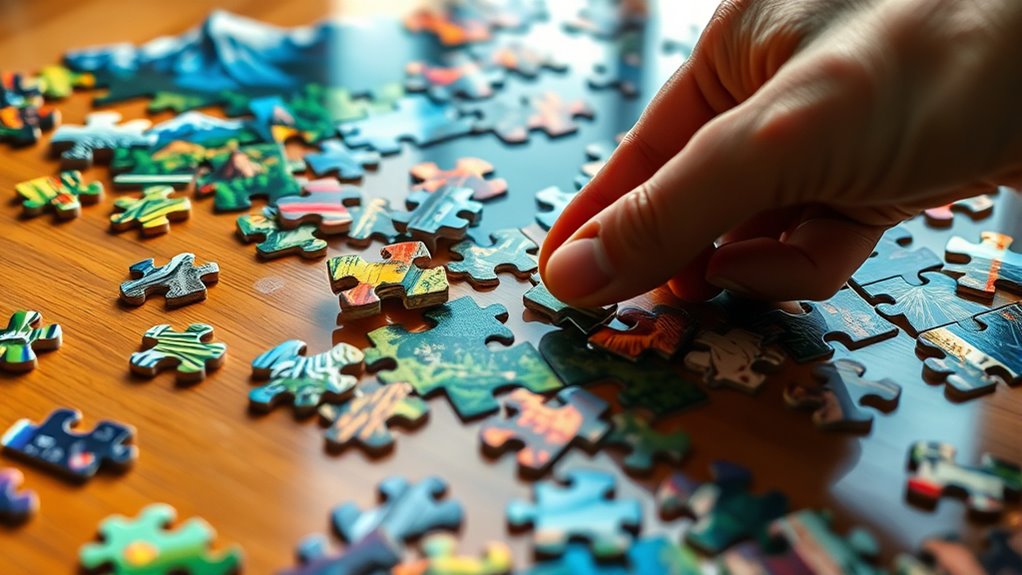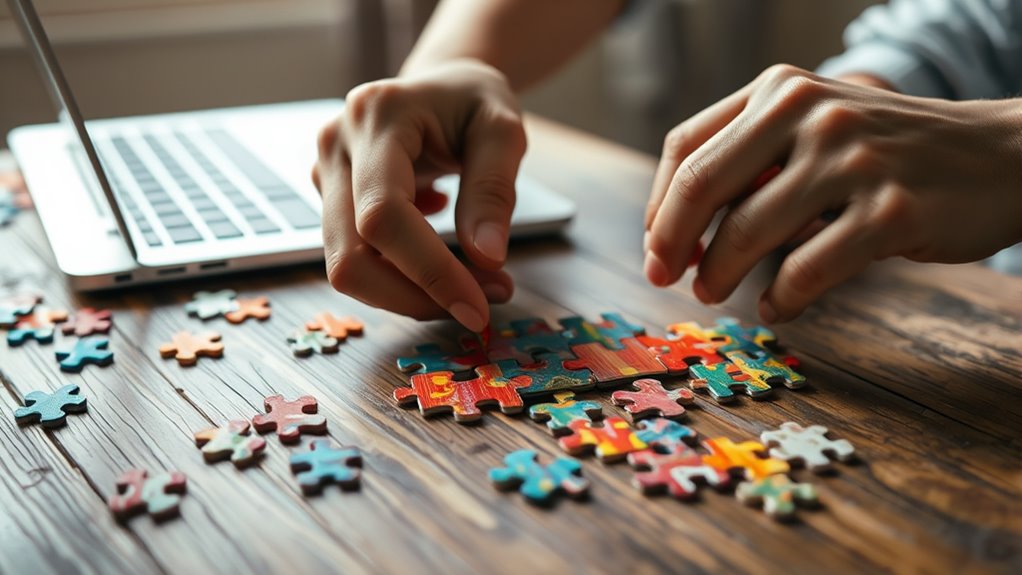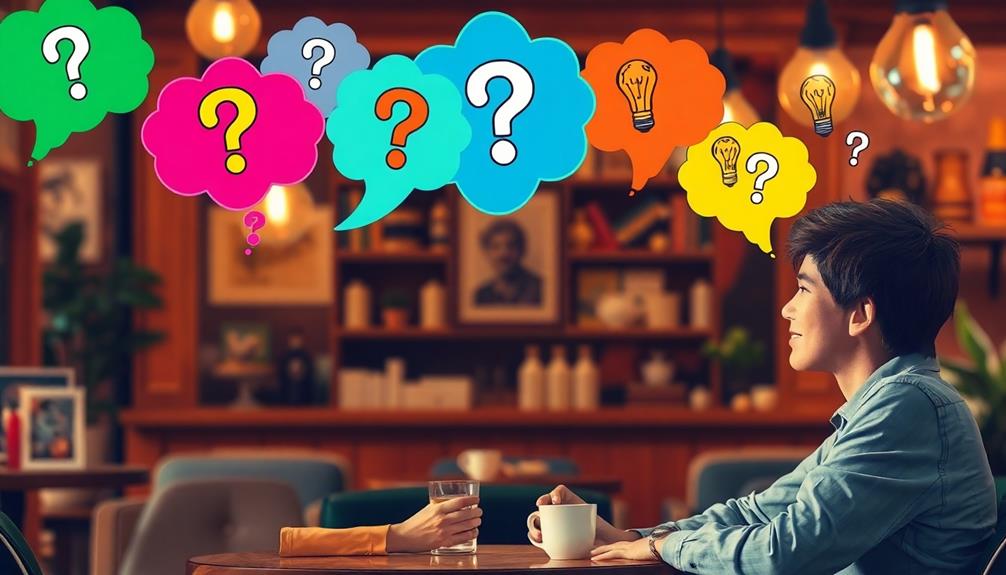You love solving puzzles because they actively engage your brain, making you recognize patterns and decode complex information. This mental challenge boosts your cognitive functions, strengthens neural pathways, and keeps you motivated by releasing dopamine, the feel-good hormone. As you progress, your brain updates its understanding and promotes flexible thinking. If you’re curious about how these processes work together to keep you hooked, exploring further will reveal even more fascinating insights.
Key Takeaways
- Puzzles activate neural pathways, enhancing brain function and promoting mental agility through active engagement.
- Recognizing patterns in puzzles simplifies complex information, boosting problem-solving efficiency and confidence.
- Solving puzzles releases dopamine, providing a rewarding feeling that encourages continued cognitive activity.
- Engaging with puzzles fosters creative and flexible thinking, keeping the brain adaptable and alert.
- The mental challenge of puzzles stimulates curiosity and motivation, making the activity both enjoyable and beneficial.

Puzzles have a unique way of engaging our minds and sparking curiosity, which is why so many people love solving them. When you pick up a puzzle, you’re inviting your brain to work actively, pushing it to make sense of complex information and find solutions. This process taps into your brain engagement, encouraging neural pathways to fire and strengthen. The challenge lies in recognizing patterns amid the chaos, which is a fundamental part of puzzle-solving. As you examine pieces or clues, you’re constantly searching for connections, similarities, or sequences that lead you toward the answer. This pattern recognition isn’t just about finding a match; it’s about decoding the underlying structure that guides the puzzle’s logic.
Your brain thrives on this activity because it turns abstract data into meaningful insight. With each step, you’re training your mind to become more efficient at identifying patterns, a skill that extends beyond puzzles into everyday problem-solving and decision-making. When you recognize a pattern, your brain fundamentally shortcuts the process, saving you time and mental effort. This quick recognition builds confidence and motivates you to tackle even more challenging puzzles, creating a cycle of cognitive reinforcement. The more you engage with puzzles, the sharper your pattern recognition becomes, enhancing your overall mental agility.
Engaging with puzzles sharpens your pattern recognition and boosts overall mental agility beyond the game.
Moreover, as you progress through a puzzle, your brain adapts to new information, constantly updating its understanding of the pattern. This dynamic process involves both logical reasoning and creative thinking, which keeps your brain engaged in a multi-dimensional way. When your brain is fully engaged, it releases feel-good chemicals like dopamine, making the experience rewarding and encouraging you to keep going. It’s this combination of mental stimulation, pattern recognition, and reward that fuels your love for solving puzzles. You’re not just playing; you’re actively training your brain, improving cognitive functions, and experiencing the satisfaction of overcoming a challenge.
Additionally, understanding how projectors work can deepen your appreciation for visual technology and enhance your home entertainment setup, making puzzle-like configurations more enjoyable. In essence, the joy of puzzle-solving lies in its ability to engage your brain in meaningful ways. It’s a mental workout that sharpens your pattern recognition skills, enhances your brain engagement, and keeps your mind active and curious. The next time you sit down with a puzzle, remember that you’re doing more than passing time—you’re strengthening the very pathways that keep your mind agile and alert.
Frequently Asked Questions
How Do Puzzles Impact Long-Term Brain Health?
Puzzles boost your long-term brain health by promoting neuroplasticity benefits, which strengthen your brain’s ability to adapt and reorganize. Regularly challenging yourself with puzzles can also enhance memory, making it easier to recall information over time. As you solve puzzles, you stimulate neural pathways, supporting mental agility and resilience, ultimately helping to keep your mind sharp and healthy well into the future.
Are Certain Puzzles Better for Specific Cognitive Skills?
Ever wonder if some puzzles sharpen specific skills better than others? You’ll find that puzzles like crosswords boost pattern recognition, while Sudoku enhances problem-solving techniques. Choosing the right puzzle depends on what skill you want to develop. For example, logic puzzles strengthen reasoning, whereas jigsaw puzzles improve visual-spatial skills. So, yes, certain puzzles are better suited for honing particular cognitive abilities, making your mental workout more targeted and effective.
Can Solving Puzzles Improve Emotional Well-Being?
Solving puzzles can definitely boost your emotional well-being by enhancing emotional resilience and providing stress relief. When you focus on completing a puzzle, you shift your mind away from worries, helping you feel calmer. As you overcome challenges, you build confidence and emotional strength, making you more resilient in daily life. Plus, the sense of achievement from finishing puzzles offers a satisfying break, reducing stress and improving overall mood.
What Age Groups Benefit Most From Puzzle-Solving?
Imagine opening a secret superpower—puzzle-solving! Different age groups gain incredible, age-specific benefits, from boosting toddlers’ developmental milestones to sharpening seniors’ memories. Kids develop problem-solving skills, teens enhance critical thinking, and adults stay mentally agile. Puzzles adapt to each stage, making them an essential tool for growth at every age. No matter when you start, you’ll enjoy tailored benefits that keep your mind sharp and vibrant!
How Do Cultural Differences Influence Puzzle Preferences?
You might notice that cultural puzzle traditions shape what puzzles you prefer, reflecting regional game preferences. For example, some cultures favor traditional riddles or logic puzzles, while others enjoy jigsaw puzzles or strategy games. These differences influence your puzzle choices, making them more meaningful and engaging. Your cultural background helps determine which types of puzzles resonate most, highlighting how regional traditions and preferences mold your puzzle-solving experiences.
Conclusion
Just like a key opening a treasure chest, solving puzzles opens your mind to new depths. Every challenge you conquer sharpens your thinking, boosts your confidence, and sparks joy. Remember, each puzzle is a tiny adventure, inviting you to explore and discover. So next time you pick one up, embrace the thrill of the journey. After all, your brain’s a puzzle itself—waiting to be unfastened, piece by piece.









